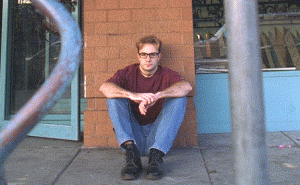
Author Bio:
Rick was born in 1970 in Dunkirk, New York on the shores of Lake Erie.
Rick attended the Massachusetts Institute of Technology and earned a degree in Mechanical Engineering by submitting a novella entitled “Goliath” as his thesis. In 1991, Rick won MIT’s Robert A. Boit Prize for Best Short Story (“Pathbeater”).
His hyperfiction short story, “LIES” has been on the web since 1994. It is one of the most well-known and critically acclaimed examples of early electronic literature, garnering praise from the Wall Street Journal, SHIFT magazine, and several other publications in print and online. “LIES” continues to be featured on the curriculae at several institutions of higher learning.
From 1996 to 2002 Rick lived in Prague, in the Czech Republic. While there he published two books including displaced (foolishness press, 1998) and WALLOW(foolishness press, 1999). His stories and poems have been featured on the pages of THINK and OPTIMISM.
Since 2002, Rick and his wife, painter Holly Spruck, have been living and working in Charlotte, North Carolina. They have two children and three cats.
What inspires you to write?
It may be an overheard conversation. It could be an interesting turn of phrase. Recurring thoughts that I can’t seem to escape. There are a couple of poets and short story writers that just make me want to write as well – there are times I turn back to them just to get inspired. Gertrude Stein does that for me. As does Raymond Carver. And Denis Johnson.
Tell us about your writing process.
I like to write every morning, first thing. Three pages, mostly brain dump. I find those pages just allow me to get the pen moving, and at times, are the catalyst I need to keep a project moving forward. Right about that page and a half point, I get my best thinking. Don’t know why, can’t explain it, but when I write something that makes me double-take, inevitably it is at that page and a half point.
I read a long time ago that a well-known author wrote 2,000 words a day. I took that goal as my own.
I write best, and by best I mean most fearlessly and most creatively, around 10am. I find that late in the afternoons the words just don’t come, and the backspace key gets beat up. I try to use that time for re-reading, or organizing, or basic editing.
I find outlines too constricting. Rather I try to write scenes, and figure out how they go together later.
For Fiction Writers: Do you listen (or talk to) to your characters?
I watch them. Almost like watching a movie. I will playback the scene in my head, and try to change things – almost like I am a director looking for at several takes of a scene, trying to find what is authentic, what is real.
What advice would you give other writers?
Know yourself. It took me years to figure out that writing late at night is not productive for me. Just imagine if I had figured that out five years earlier, or even more. I could have saved myself so much turmoil. Keep writing, no matter what. As a self-publisher I find myself playing the roles of editor, publicist, cover designer, agent, web site designer, etc. All of that is fine, but I have to constantly balance that against my core competency, which is writing. All the other stuff is so much easier when I have already saved my 2,000 words for the day.
How did you decide how to publish your books?
I probably was not patient enough with the traditional publishing route. I jumped almost immediately to self-publishing. Partly to allow me to learn the ropes of all the different aspects of the publishing game, but also partly because in this day and age I can do all of it myself. I am a slow learner, but if I had been trying to do this ten years ago, twenty years ago, it would have been so much more difficult. Self-publishing is not for everyone – but it gets easier and easier. No matter which avenue you choose, if you want to be successful, get used to the idea of being willing to market yourself.
What do you think about the future of book publishing?
I heard it said int he early days of the Internet that “content is king”. If that is true, than all us writers are in the best position in the long run. I think disintermediation is going to continue to the point where authors and readers will have a more direct connection. That is not to say that others will not have a chance to get a piece of the deal – in fact, I think that is probably the most dangerous part of this business in the future: naive writers have the potential to get ripped off by unscrupulous parties. I am always looking for the free or the cheap way to get to the market – I feel for anyone hoping to take a shortcut by investing their money.
What genres do you write?
Fiction, non-fiction, poetry, short stories, memoir.
What formats are your books in?
Both eBook and Print
Website(s)
Rick Pryll Home Page Link
Link To Rick Pryll Page On Amazon
Your Social Media Links
http://www.facebook.com/rickpryll
http://twitter.com/rickpryll
